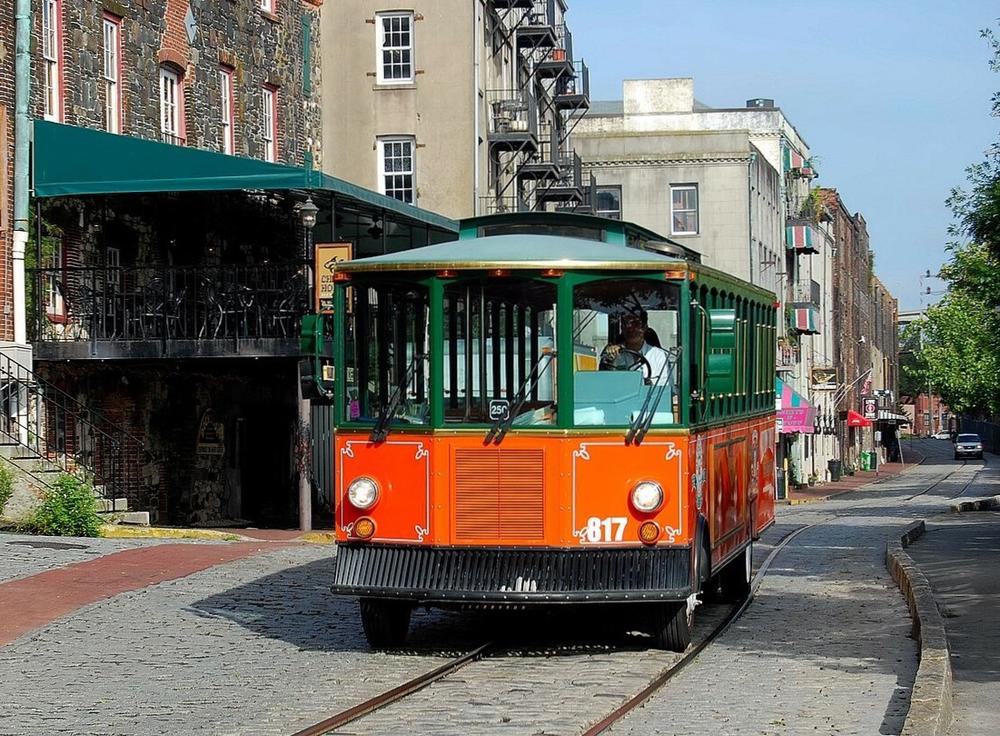
Caption
A trolley tour bus drives down River Street in downtown Savannah.
Credit: Creative Commons / LoneStarMike
|Updated: April 17, 2024 9:24 AM
LISTEN: If passed, the measure would make trolley tour companies install directional speaker system technology or use in-ear listening devices. GPB's Benjamin Payne reports.

A trolley tour bus drives down River Street in downtown Savannah.
Savannah's popular trolley tours may soon sound less noisy to residents and passersby, if a proposed ordinance passes City Council muster and achieves tourism officials' goal of preventing amplified sound from spilling out onto the streets of the city's historic downtown.
Adored by tourists yet loathed by many locals, the more than 100 registered trolley tour vehicles in the Hostess City would be required to use directional, noise-reducing speaker systems, under an ordinance recommendation made by the Savannah Office of Special Events, Film and Tourism.
Alternatively, trolley tour guides could speak to their passengers through in-ear devices.
The proposal was presented by Savannah City Manager Jay Melder at a Thursday workshop meeting of City Council, where he voiced support while also acknowledging the cost that such a regulation would impose on tour companies.
“I do want to note that this technology is not inexpensive for our operators, at roughly $10,000 to $12,000 a vehicle,” he said, referring to the directional speaker systems. “But I do think that pushing our industry towards these better technologies — especially when they're technologies that the industry themselves have identified — is a right next step for Council.”
One trolley tour company has already invested in “a few prototypes” of directional speakers, Melder added, which were well received by members of the Downtown Neighborhood Association who were invited to three demonstrations of the technology.
“We had about 20 people join board members to see if the speakers would be viable,” DNA president David McDonald said in a statement shared by Melder at the workshop meeting. “The consensus seemed to be that the installation of these speakers significantly reduced the volume of noise coming from inside the trolley.”
The proposed ordinance, which is still being written, would not require immediate compliance but rather set an 18-month phase-in period, by the end of which operators' entire fleets would need to use either of the two technologies.
There are approximately 110 registered trolley tour vehicles in Savannah between the three companies registered to operate in the city — Old Savannah Tours, Historic Tours of America (operating under the brand name Old Town Trolley Tours) and Gray Line Savannah — which altogether employ more than 180 trolley tour guides.
City Council members who spoke at the workshop seemed supportive of the recommended ordinance, which, according to Melder, would be ready for a vote within one month.
“I'm always going to vote for protecting the quality of life in any district,” Alderwoman Linda Wilder-Bryan said. “I'm downtown all the time, and you can really hear what the [trolley] tour guide is saying.”
“I just want to make sure that we let the industry know that we're not just targeting them,” said Alderman Detric Leggett, whose district includes almost all of downtown. “We want to look at the entire picture because there's so many different things that contribute to this noise that's going on, especially after the hours of seven, eight, nine o'clock at night.”
However, Melder shared that the Downtown Neighborhood Association communicated to him that trolley tour noise constitutes “95% of the problem.”
The proposed noise ordinance, Melder suggested, would be a reasonable compromise to what he called “drastic measures” that some downtown residents have asked for, such as reducing the number of tours that are currently allowed.
“Downtown's always been a mixed-use neighborhood,” Melder said. “And downtown is not a gated community. You come downtown to be able to enjoy the nightlife, to enjoy walkable streets, to enjoy the squares, to enjoy all of the amenities that downtown has to offer.
“So, we are not going to be able to achieve the kind of tranquil, bucolic neighborhood setting that might exist in other places in our region,” he continued. “That's not what downtown is. And it shouldn't be. And our residents shouldn't have that expectation.”
